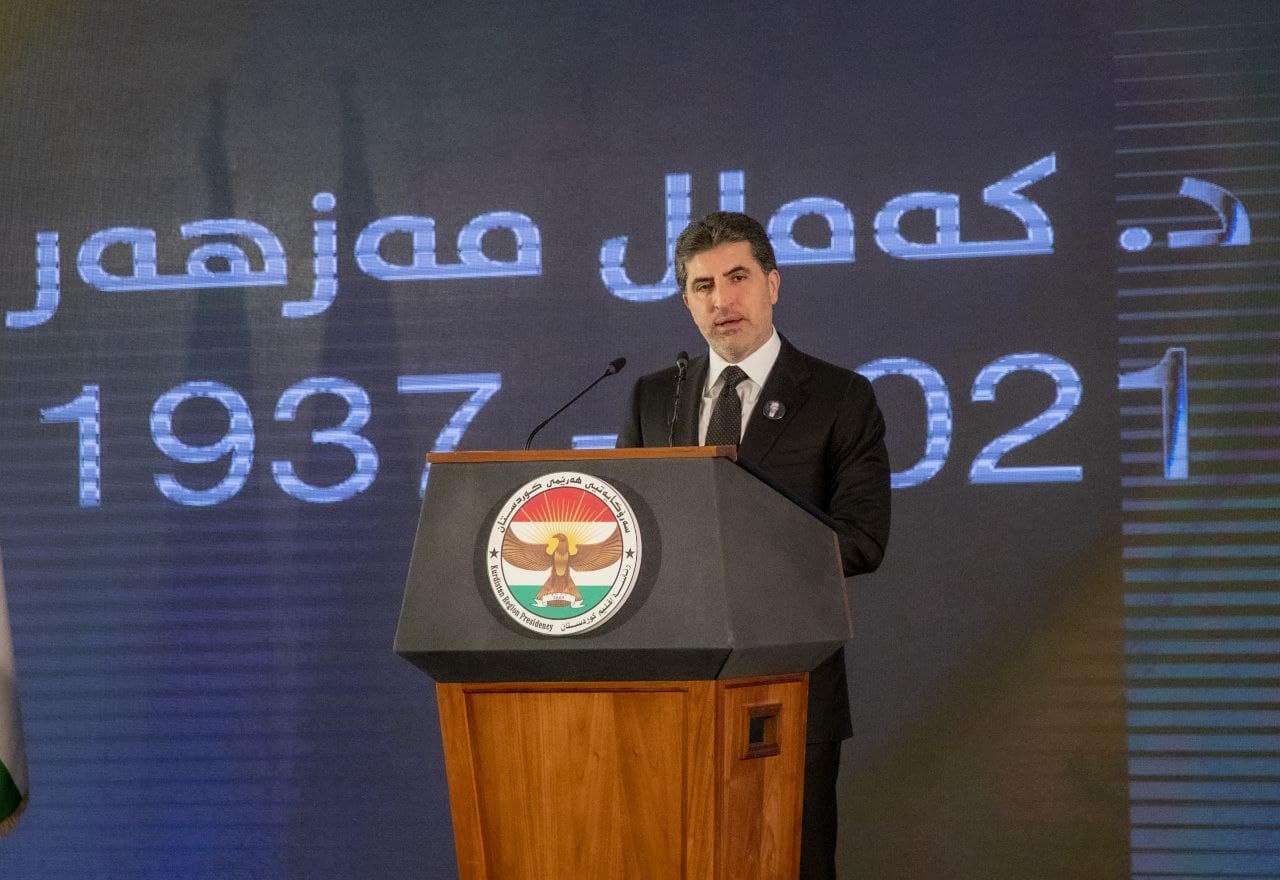
2021-03-24T10:55:01.000000Z
Erbil, Kurdistan Region, March 24, 2021
Kurdistan Region President Nechirvan Barzani attended the wreath laying ceremony of the late historian, Dr. Kamal Mazhar, which was arranged by the Kurdish Academy in Erbil. At the ceremony, which was attended by the representatives of Iraq’s Prime Minister, Iraq’s President, the Kurdistan Regional Government Minister of Culture, the late Dr. Kamal Mazhar’s wife and family as well as a number of writers and intellectuals. President Nechirvan Barzani laid a wreath at the casket of the late Dr. Kamal Mazhar and delivered the following speech:
The honorable representative of Iraq’s Prime Minister Mustafa al-Kadhimi,
Mr. Usman al-Ghanimi, the Interior Minister of Iraq,The Honorable Representative of the President, Honorable Guests,
Dear Authors and Intellectuals,
Mrs. Shahla Tahir Haidari, Wife of the late Professor Dr. Kamal Mazhar,
His Honorable Family and Relatives,
I welcome you to the wreath laying ceremony of the late Dr. Kamal Mazhar’s, who was a respected and valued renowned historian known for his contributions and research on the history of the Kurdish people and the region. I thank you all for being here today.
Dr. Kamal Mazhar was born in Kirkuk. Being Kirkuki is not an easy task. Since, unfortunately, over the past decades, for the Kirkuki Kurds, being Kirkuki meant a hard life, insecurity, and facing constant denial of one’s rights on their own land. Dr. Kamal Mazhar wrote about these struggles and provided evidence of the injustices committed against Kirkuk in his book, “Kirkuk and its Surroundings.”
Dr. Kamal Mazhar was a scholar of the history of Kurdistan and the greater region. His relentless efforts throughout his career shed light on the history of the Kurds, Kurdistan and the region, by investigating thousands of documents and explaining the chain of historical events. His work is exceedingly valued and influential.
This prolific historian, whom we all pay tribute to today, has authored books and research on the history of Kurdistan, and supervised hundreds of academic papers in the field of history while teaching at universities across Iraq.
Dr. Kamal Mazhar’s work continuously demonstrated the great bonds between nations and peoples. He sought to prove that different nations and peoples have coexisted in peace and harmony, but the wrongful policies of governments have often led to disputes among them.
As a Kurdish scholar, he sought to create a bridge between the people of this region through historical research and showed that their past coexistence is a testament to the existing solidarity between these people, contrary to the political rivalries that have driven the people of this region apart and antagonized them.
He was able to base his academic research on the history of Kurdistan through consistent scientific methods and rejected unfounded historical claims and unreliable sources. He used history as a science to uncover the facts surrounding historical events. This indeed is a great achievement within history studies, and also for people to base their own conclusions from on scientific facts and not on hearsay.
Dr. Kamal Mazhar never turned a blind eye to the mistakes and shortcomings of Kurds and their leaders, nor did he stop championing the Kurdish cause. He maintained relations with the leadership of Kurdistan and offered them valuable advice throughout the Ba’athist rule in Iraq.
Suppression of the Kurdish people by the regional governments never stopped Dr. Kamal Mazhar from learning and writing about about neighboring people. With the same academic integrity, Dr. Kamal wrote about the history of Iraq, Iran, the Azeris and the Armenians.
Dr. Kamal Mazhar was a great social activist. He wrote about women’s role in history at a time when the feminist movement in the world was still in its infancy, especially in Kurdistan. He viewed women as an important social component, spoke about their position in society and championed against reactionary views on women’s role. With the same commitment, Dr. Kamal Mazhar supported the plight of the Iraqi working class.
Honorable Guests,
Kurds and Kurdistan have endured suppression throughout history. Kurdistan has been subjected to destruction and its history has been distorted. The Peshmarga sacrificed their lives to preserve Kurdistan, while scholars, writers and intellectuals have endured hardships in order to preserve Kurdish language, and culture. It is therefore that scholars and writers like Dr. Kamal Mazhar deserve utmost respect.
Throughout the revolutions and liberation movements in Kurdistan, the Kurdish intellectuals and writers, played a crucial role in preserving the Kurdish language and culture in the absence of state and national institutions. They managed to do that because of their unwavering belief and great intellectual abilities despite economic difficulties. This is why the cultural movement in Kurdistan has continuously been strong despite the obstacles and lack of resources.
In the years following 2003, Dr. Kamal Mazhar wanted to continue his research elsewhere, which is why we supported him to bring his rich archive and library to Erbil. But unfortunately due to poor health conditions, he was not able to complete what he so passionately wanted to do.
We bid farewell to this great Kurdish scholar and historian who left us a legacy of national pride. He will live forever for his prolonged academic services in collages across Iraq while future generations will benefit from his contributions. The people of Kurdistan and the academic community in Iraq will always take pride in his work.
I sincerely thank the Kurdish Academy for arranging this ceremony. I welcome you once again. May Dr. Kamal Mazhar rest in peace. I, offer my condolences to Mrs. Shahla Tahir Haidari, his wife, family and the people of Kurdistan and Iraq.
Thank you.
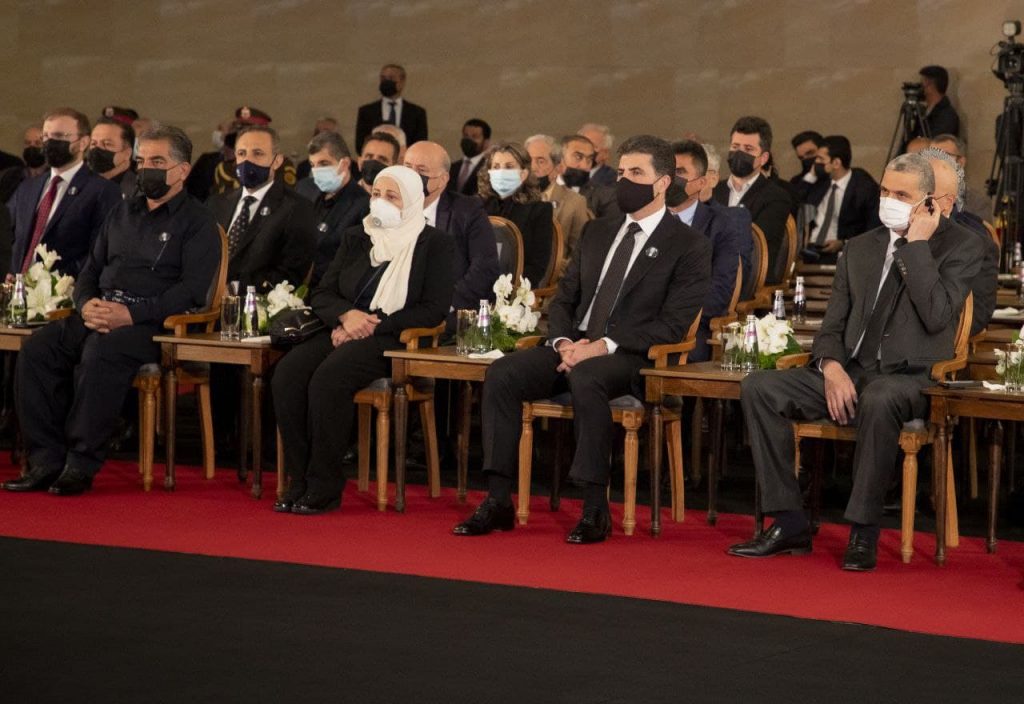
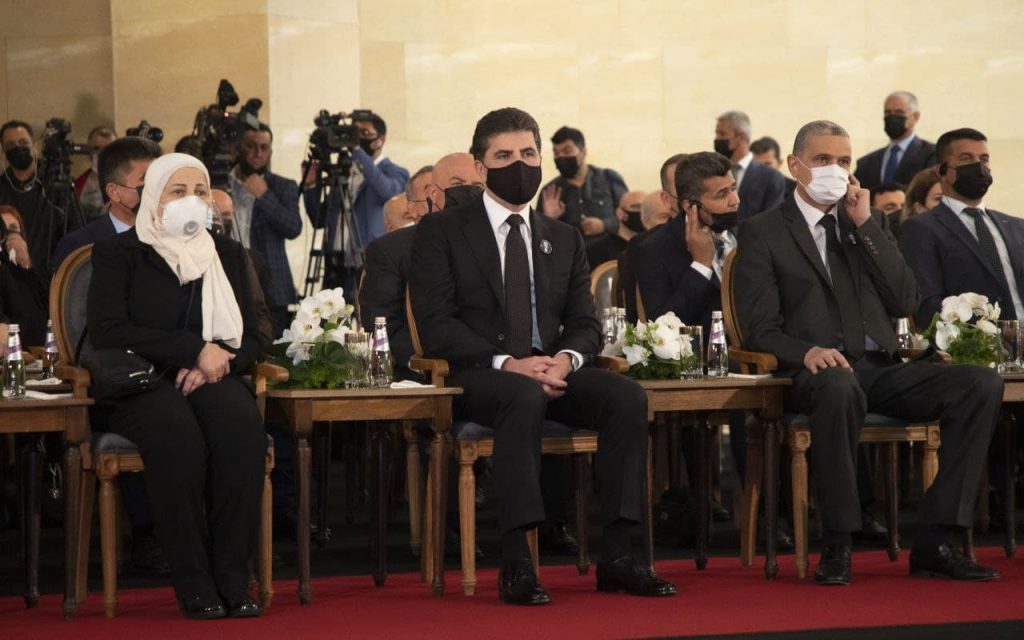
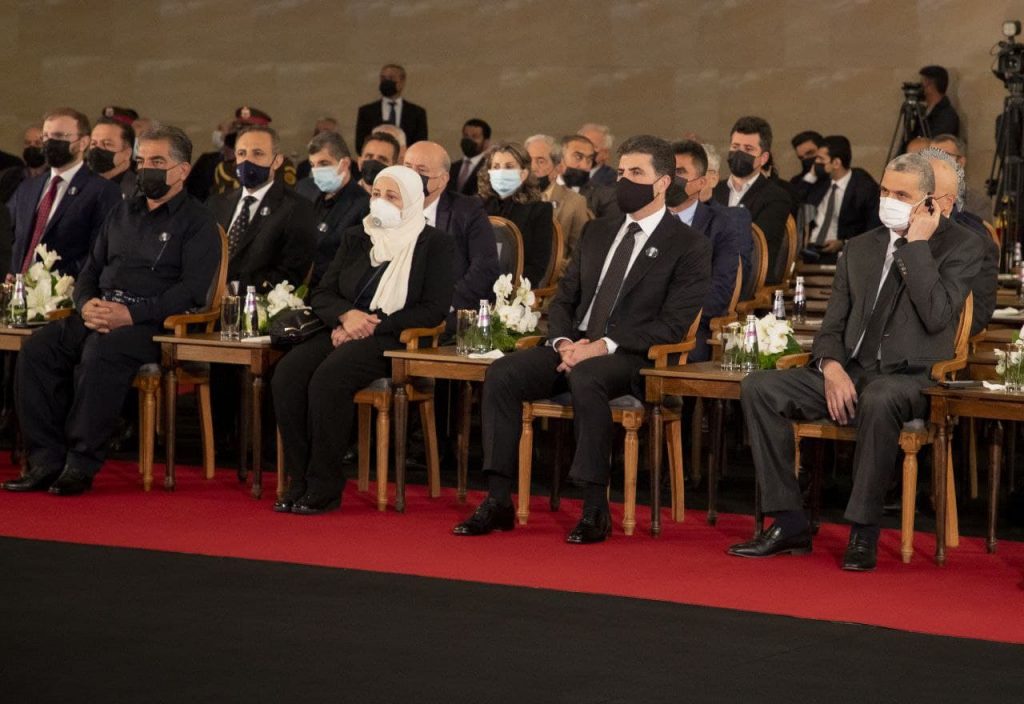
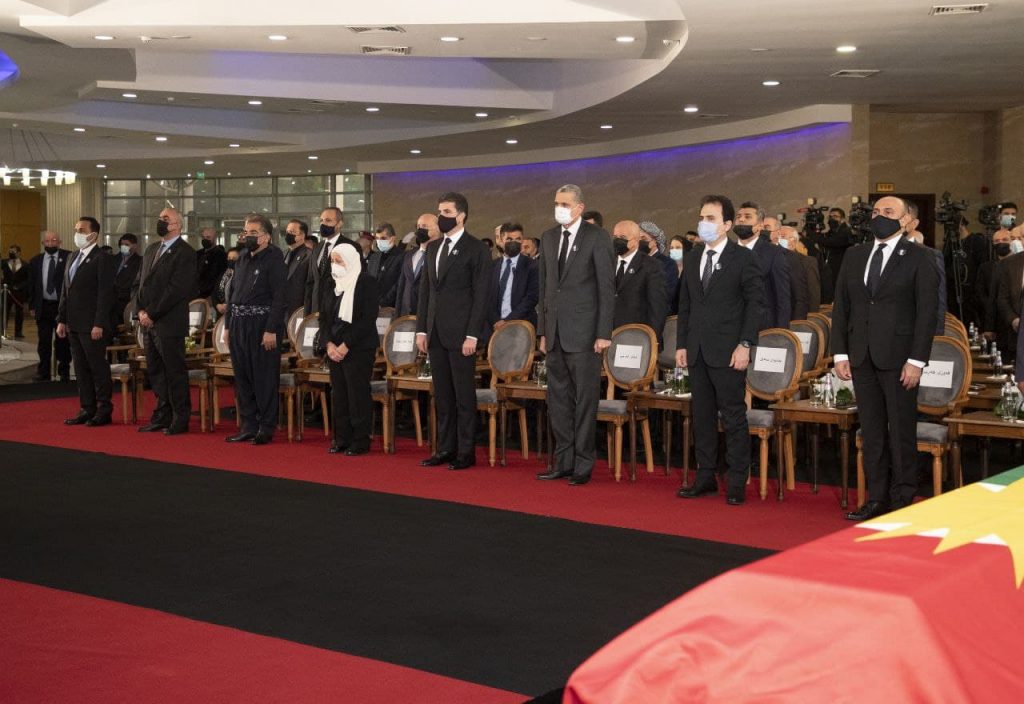
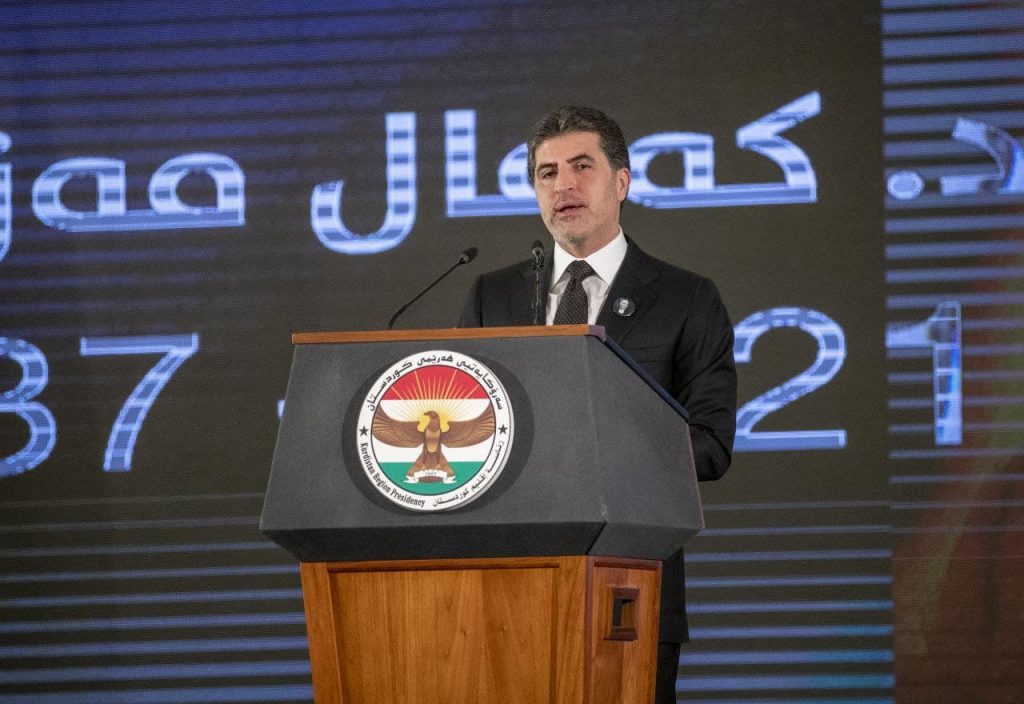
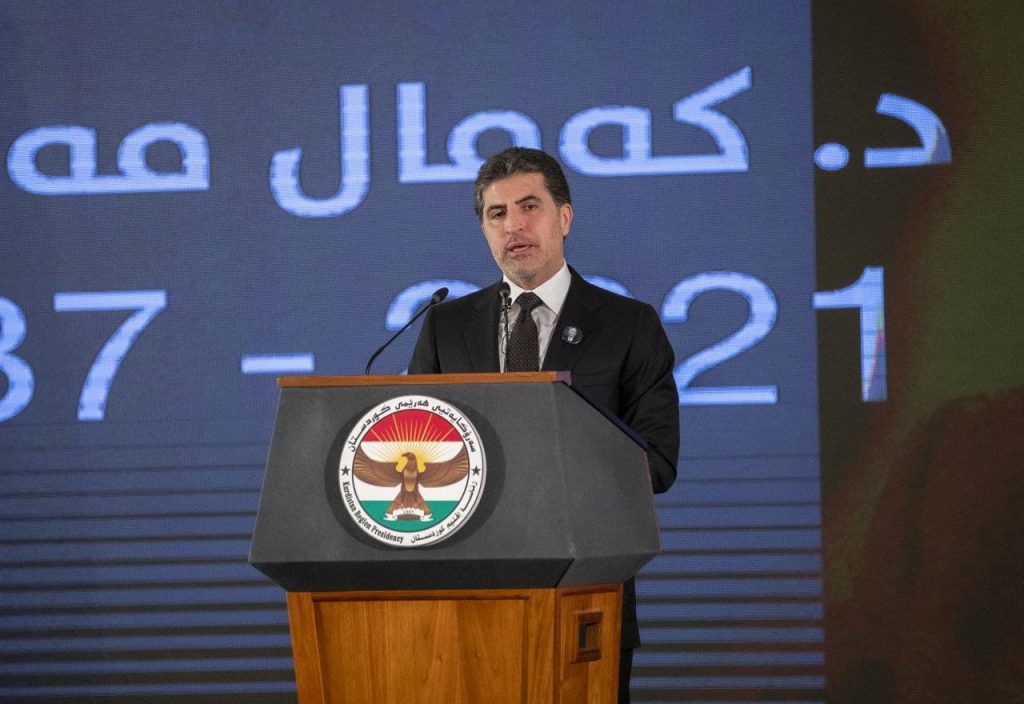
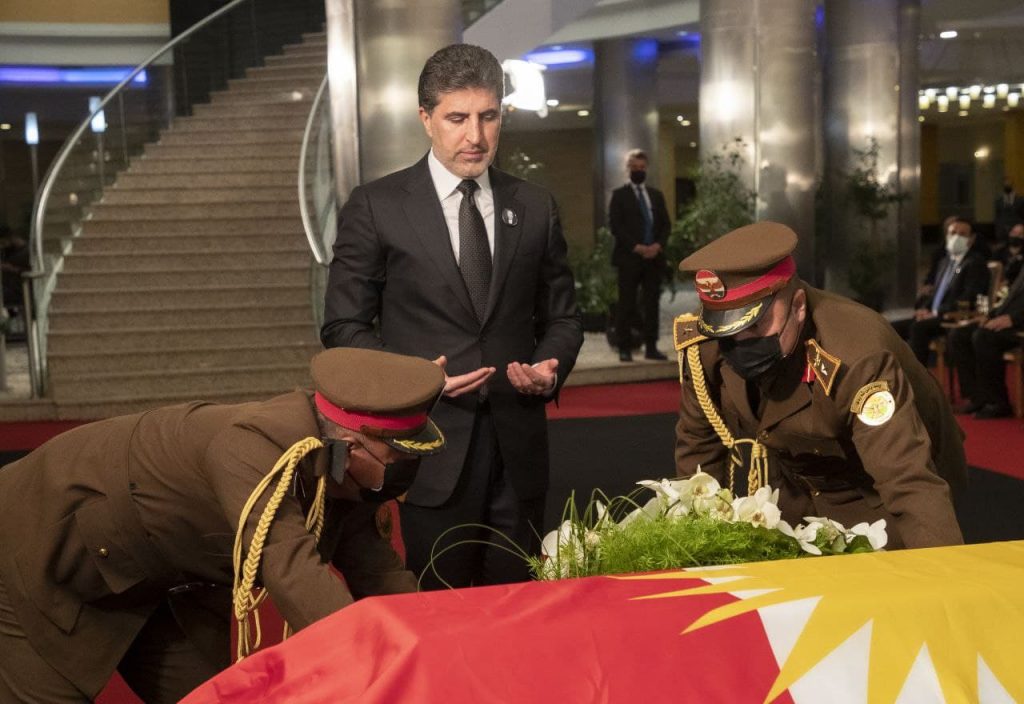
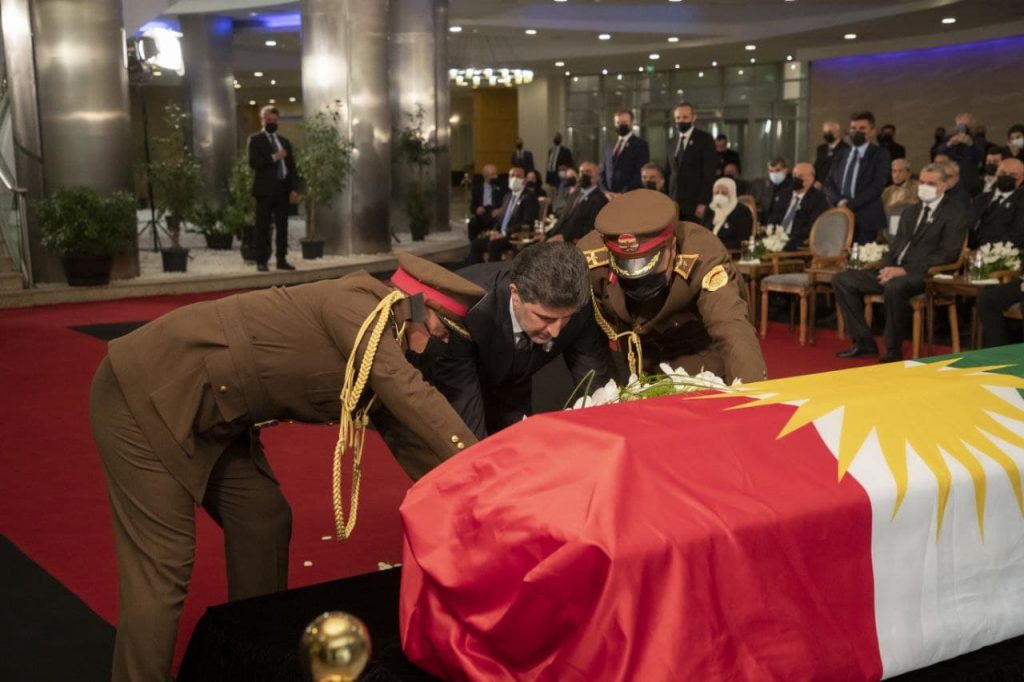
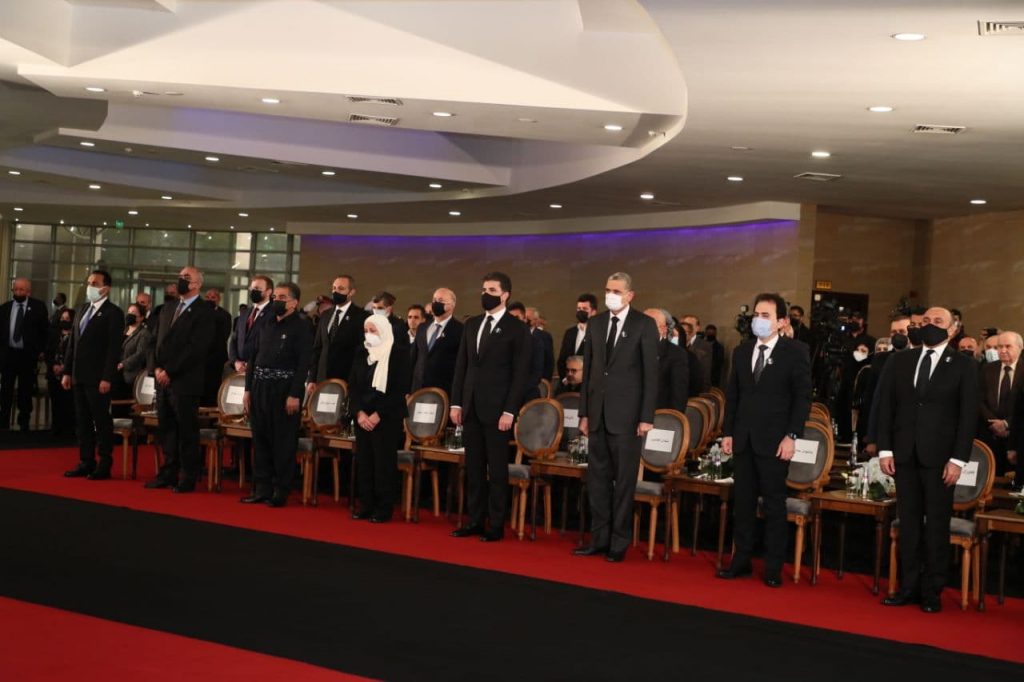
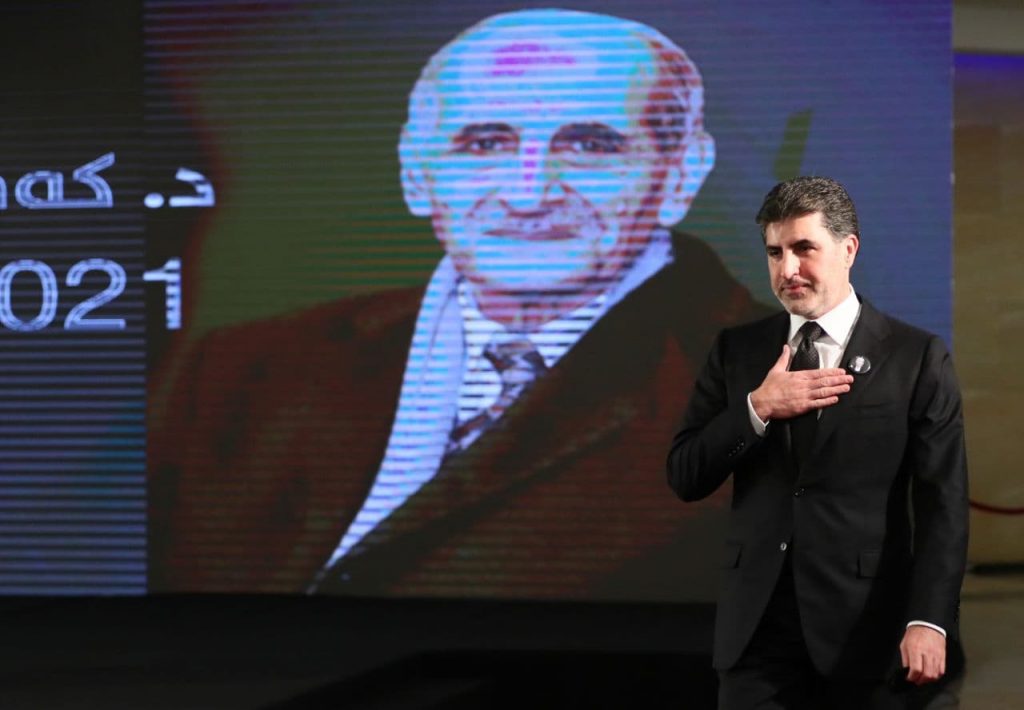
Kurdistan Region President Nechirvan Barzani attended the wreath laying ceremony of the late historian, Dr. Kamal Mazhar, which was arranged by the Kurdish Academy in Erbil. At the ceremony, which was attended by the representatives of Iraq’s Prime Minister, Iraq’s President, the Kurdistan Regional Government Minister of Culture, the late Dr. Kamal Mazhar’s wife and family as well as a number of writers and intellectuals. President Nechirvan Barzani laid a wreath at the casket of the late Dr. Kamal Mazhar and delivered the following speech:
The honorable representative of Iraq’s Prime Minister Mustafa al-Kadhimi,
Mr. Usman al-Ghanimi, the Interior Minister of Iraq,The Honorable Representative of the President, Honorable Guests,
Dear Authors and Intellectuals,
Mrs. Shahla Tahir Haidari, Wife of the late Professor Dr. Kamal Mazhar,
His Honorable Family and Relatives,
I welcome you to the wreath laying ceremony of the late Dr. Kamal Mazhar’s, who was a respected and valued renowned historian known for his contributions and research on the history of the Kurdish people and the region. I thank you all for being here today.
Dr. Kamal Mazhar was born in Kirkuk. Being Kirkuki is not an easy task. Since, unfortunately, over the past decades, for the Kirkuki Kurds, being Kirkuki meant a hard life, insecurity, and facing constant denial of one’s rights on their own land. Dr. Kamal Mazhar wrote about these struggles and provided evidence of the injustices committed against Kirkuk in his book, “Kirkuk and its Surroundings.”
Dr. Kamal Mazhar was a scholar of the history of Kurdistan and the greater region. His relentless efforts throughout his career shed light on the history of the Kurds, Kurdistan and the region, by investigating thousands of documents and explaining the chain of historical events. His work is exceedingly valued and influential.
This prolific historian, whom we all pay tribute to today, has authored books and research on the history of Kurdistan, and supervised hundreds of academic papers in the field of history while teaching at universities across Iraq.
Dr. Kamal Mazhar’s work continuously demonstrated the great bonds between nations and peoples. He sought to prove that different nations and peoples have coexisted in peace and harmony, but the wrongful policies of governments have often led to disputes among them.
As a Kurdish scholar, he sought to create a bridge between the people of this region through historical research and showed that their past coexistence is a testament to the existing solidarity between these people, contrary to the political rivalries that have driven the people of this region apart and antagonized them.
He was able to base his academic research on the history of Kurdistan through consistent scientific methods and rejected unfounded historical claims and unreliable sources. He used history as a science to uncover the facts surrounding historical events. This indeed is a great achievement within history studies, and also for people to base their own conclusions from on scientific facts and not on hearsay.
Dr. Kamal Mazhar never turned a blind eye to the mistakes and shortcomings of Kurds and their leaders, nor did he stop championing the Kurdish cause. He maintained relations with the leadership of Kurdistan and offered them valuable advice throughout the Ba’athist rule in Iraq.
Suppression of the Kurdish people by the regional governments never stopped Dr. Kamal Mazhar from learning and writing about about neighboring people. With the same academic integrity, Dr. Kamal wrote about the history of Iraq, Iran, the Azeris and the Armenians.
Dr. Kamal Mazhar was a great social activist. He wrote about women’s role in history at a time when the feminist movement in the world was still in its infancy, especially in Kurdistan. He viewed women as an important social component, spoke about their position in society and championed against reactionary views on women’s role. With the same commitment, Dr. Kamal Mazhar supported the plight of the Iraqi working class.
Honorable Guests,
Kurds and Kurdistan have endured suppression throughout history. Kurdistan has been subjected to destruction and its history has been distorted. The Peshmarga sacrificed their lives to preserve Kurdistan, while scholars, writers and intellectuals have endured hardships in order to preserve Kurdish language, and culture. It is therefore that scholars and writers like Dr. Kamal Mazhar deserve utmost respect.
Throughout the revolutions and liberation movements in Kurdistan, the Kurdish intellectuals and writers, played a crucial role in preserving the Kurdish language and culture in the absence of state and national institutions. They managed to do that because of their unwavering belief and great intellectual abilities despite economic difficulties. This is why the cultural movement in Kurdistan has continuously been strong despite the obstacles and lack of resources.
In the years following 2003, Dr. Kamal Mazhar wanted to continue his research elsewhere, which is why we supported him to bring his rich archive and library to Erbil. But unfortunately due to poor health conditions, he was not able to complete what he so passionately wanted to do.
We bid farewell to this great Kurdish scholar and historian who left us a legacy of national pride. He will live forever for his prolonged academic services in collages across Iraq while future generations will benefit from his contributions. The people of Kurdistan and the academic community in Iraq will always take pride in his work.
I sincerely thank the Kurdish Academy for arranging this ceremony. I welcome you once again. May Dr. Kamal Mazhar rest in peace. I, offer my condolences to Mrs. Shahla Tahir Haidari, his wife, family and the people of Kurdistan and Iraq.
Thank you.















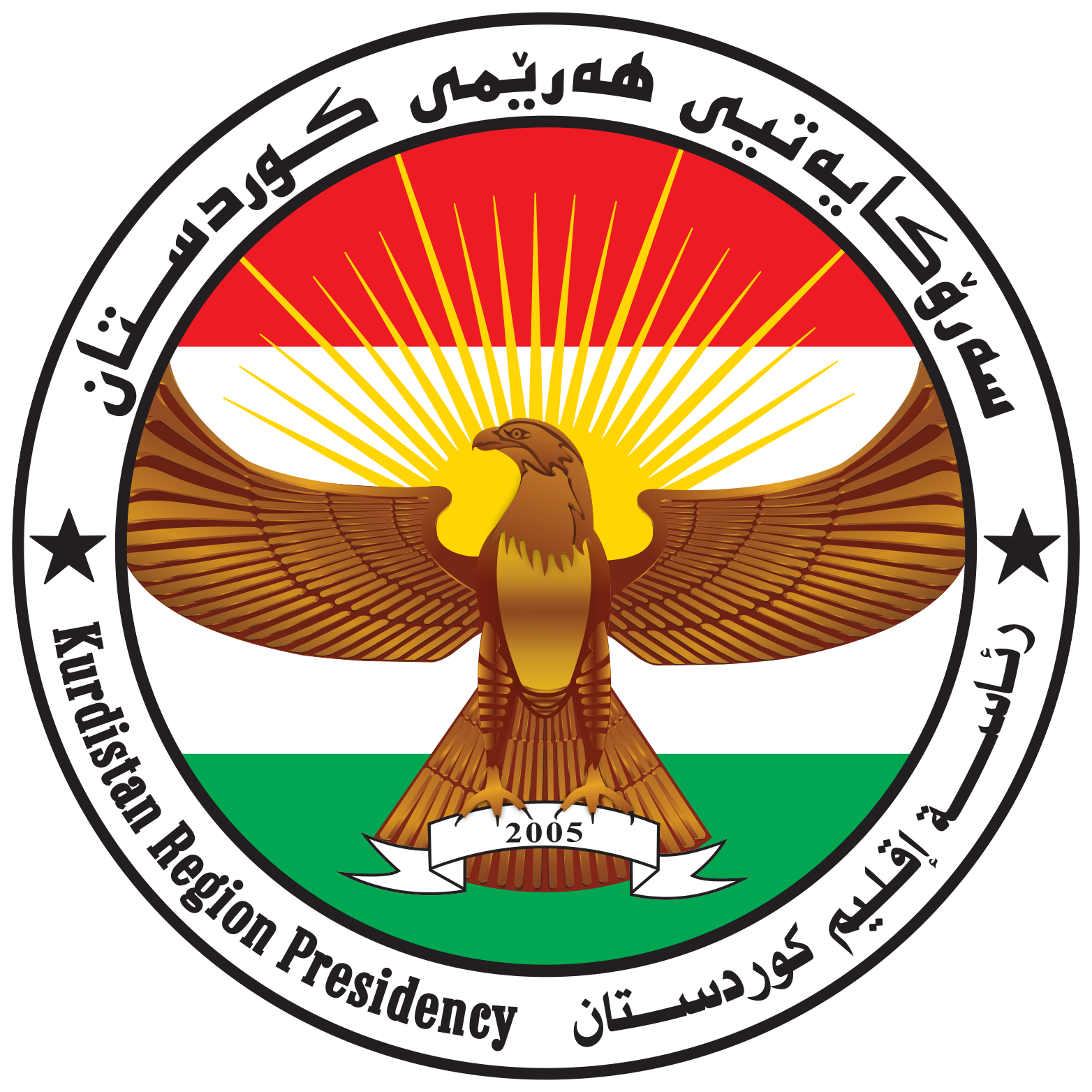

 پەرلەمانی کوردستان
پەرلەمانی کوردستان
